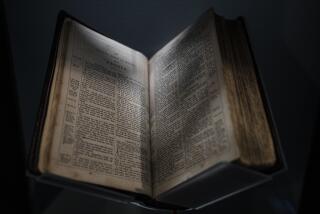Under whom?
- Share via
EVEN BACK IN 1953, the year before Congress added the words “under God” to the Pledge of Allegiance, most Americans probably thought the pledge was fine as it was.
For the 62 years the pledge survived without God, it served as a communal recitation that bound together all the people who felt obligation to and affection for this nation. Because our national anthem, with its archaic poetry and octave-and-a-half range, is all but unsingable for most people, the pledge was the bit of civic unity we all shared, words we all knew and could murmur in something approaching unison and harmony.
Unlike lawmakers who injected God in 1954 as a McCarthyite sneer at godless communism, many people now recognize that atheists, agnostics, animists and Buddhists -- none of whom believe in an all-encompassing God -- can be wonderful citizens. For all the renewed interest in religion in this country, it’s unlikely today’s Congress would add “under God.”
Once in, though, taking the words out ends up looking like an attack on religious belief, which in our view is probably reason enough, as a matter of policy, to let it be. But courts don’t have the luxury of deciding what’s in the best interest of society; they have to decide specific legal disputes before them, and a federal judge in Sacramento on Wednesday ruled that the wording is unconstitutional, as the U.S. 9th Circuit Court of Appeals did three years ago.
Even judges who back the divine wording sometimes provide cogent arguments for why it should be omitted. Last month, a Virginia appeals court upheld a state law requiring the daily recitation of the pledge in public schools. “Undoubtedly, the pledge contains a religious phrase, and it is demeaning to persons of any faith to assert that the words ‘under God’ contain no religious significance,” Judge Karen Williams wrote. However, she decided that the pledge is a patriotic activity, not a religious one.
Religion ought to be a private matter and should play no role in a daily, government-sanctioned ritual. Children aren’t required to say the words, but what Williams rightly calls a “religious phrase” is chanted each day in their presence, and they and their parents have no choice. It’s unlikely, though, that anyone has ever been converted to a monotheistic religion simply from listening to repetitions of the phrase.
The book “The Knickerbocker Tradition,” a collection of papers on American history published in 1974, describes a “widespread revulsion against institutional and established religion” among the first patriots. “The notion of separation of church and state,” the book says, “ ... was a practical device making it possible for people of diverse beliefs and unbeliefs to carry on their political affairs together.”
Religion tends to hijack civic culture during times of fear and stress. Even the ostensibly godless Josef Stalin, our initial Cold War nemesis, embraced religion during the Nazi invasion of communist Russia. The currency engraving “In God We Trust” is an artifact of the Civil War, and “under God” is a reminder of the height of the Cold War. Little wonder that Congress in these fearful times will not seriously consider removing words that should never have been added to what was a perfectly good pledge -- and that the Supreme Court is unlikely to uphold the latest ruling.
The colonists, though, had the right idea for carrying forward government in a truly patriotic way -- “for all,” as the pledge ends. The pledge doesn’t need deification. Its best and highest use is to bind us together as common citizens, regardless of faith, with a common commitment to this nation.
More to Read
Sign up for Essential California
The most important California stories and recommendations in your inbox every morning.
You may occasionally receive promotional content from the Los Angeles Times.













